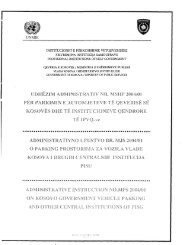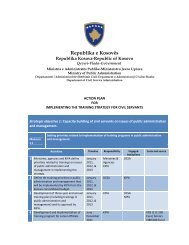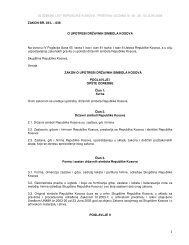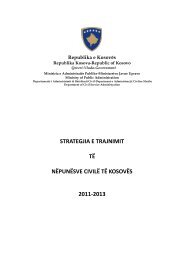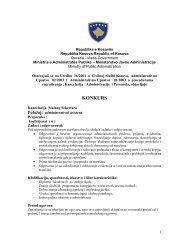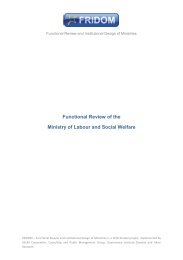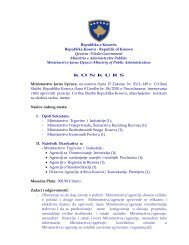Download
Download
Download
You also want an ePaper? Increase the reach of your titles
YUMPU automatically turns print PDFs into web optimized ePapers that Google loves.
Issues raised by staff and others<br />
Options<br />
The new arrangements for the Pharmacy Inspectorate are causing some problems such as<br />
having to report through the Minister to the Kosovo Medicines Agency about regional<br />
inspections and some practical coordination problems.<br />
There are problems with roles and responsibilities and information flows related to the work<br />
for the Health Inspectorate. The Department of Health Services is not routinely provided<br />
with the results of inspections and information can be difficult to access, making it difficult for<br />
this department to fulfil its functions, including the functions related to the Office for Hospital<br />
Institutions (vacant position).<br />
Once the Sanitary Inspectorate moves to the Food Safety Agency, there are remaining<br />
functions, such as inspecting hospitals and educational institutions, which needs to be<br />
assessed in terms of future options.<br />
If the option of having service areas like public health; primary health; secondary and tertiary<br />
services and mental health and pharmaceuticals is accepted, then these departments could<br />
undertake routine monitoring of performance of providers such as quarterly performance reports<br />
against performance expectations in service agreements and the statement of service performance<br />
(see Appendix G). The service auditing and inspection function (inspectorates) could focus more<br />
narrowly on priority issues.<br />
The problems associated with the Pharmacy Inspectorate’s separation could be addressed in a<br />
number of ways ranging from information sharing protocols to structural solutions. Further work could<br />
be done on possible solutions.<br />
With regard to the option to combine inspectorates for pharmacy, health and the sanitary<br />
inspectorate functions remaining after the other functions move to the new food safety agency, as<br />
noted earlier, this would require careful analysis given the gravity of the issues these inspectorates<br />
are dealing with and the reasons the government has for constituting them in their current forms.<br />
Special offices and departments<br />
There are several special offices, often set up under administrative instructions from the PMO such<br />
as:<br />
Office for Gender, Human Rights and Equality<br />
Office for European Integration<br />
Office for Donor Coordination and Capital Investment<br />
Office or Department of Legal Services<br />
Office or Department of Information<br />
Some of the special interest offices appear to be staffed by well qualified people who would be<br />
capable of contributing to policy and planning in much wider areas than the areas they are assigned<br />
to under these offices. There appears to be a large number of special interest positions, for example<br />
the legal office is supposed to have two positions relating to EU integration and law. This appears to<br />
be an overload of legal positions in a ministry that is lacking key health policy and planning positions.<br />
As noted in the section on Strategic Management, consideration should be given to how to free<br />
these staff members up to permit them to work more broadly, including creating a more generic<br />
policy and planning function under the Department of Strategic Management where the gender,<br />
human rights, equality, donor coordination and EU work could be undertaken along with other core<br />
work to facilitate the ministry-wide policy, planning and monitoring processes.<br />
Training issues and options<br />
Staff and others have noted that there is a great need for competent managers in the health sector,<br />
particularly given the increasing management demands being placed on directors of providers to<br />
manage resources more effectively. Problems with management positions being filled by doctors<br />
lacking management skills was noted as an issue, including in the hospitals and family medicine<br />
centres. There are also increasing demands on directors in the MOH to meet a very challenging set<br />
33



